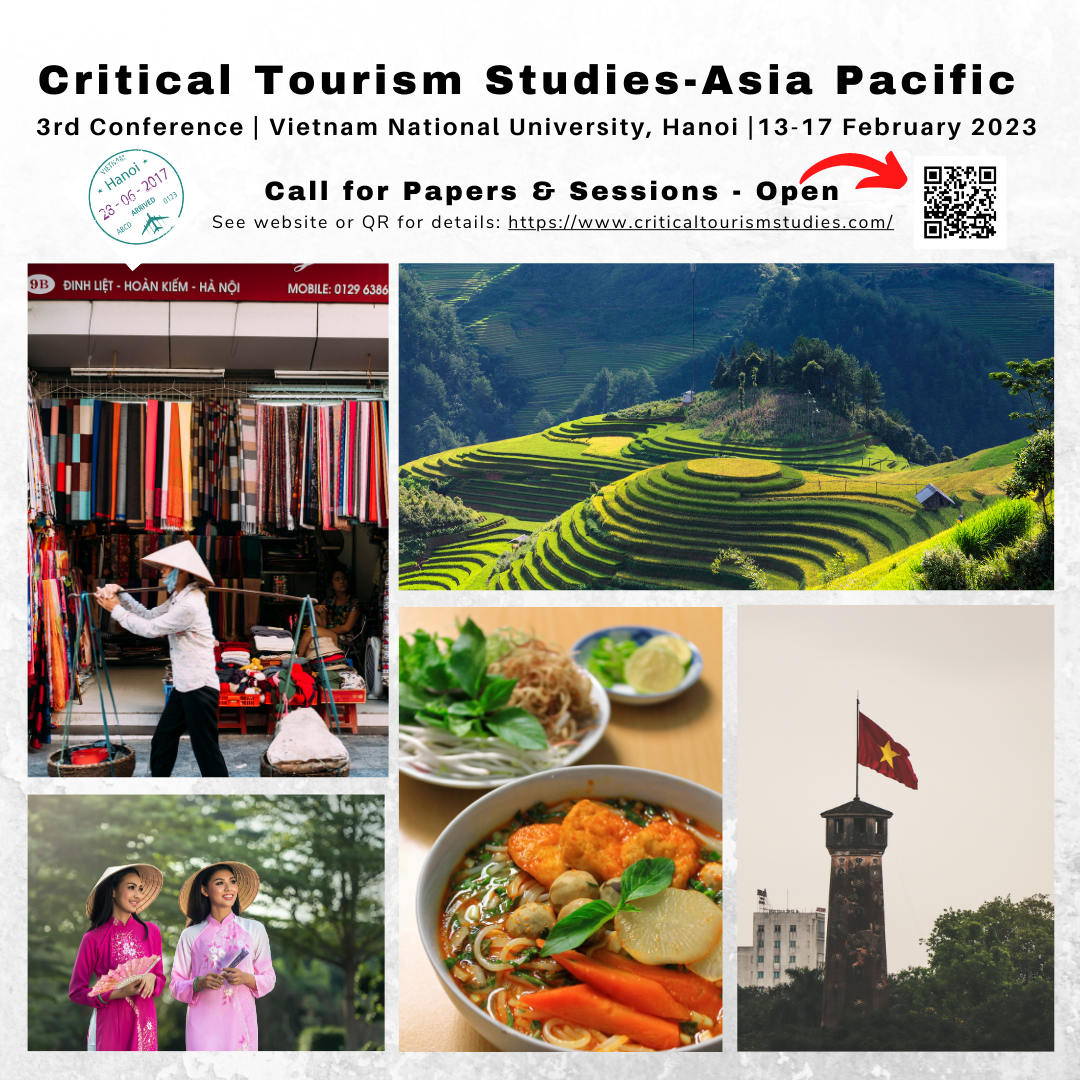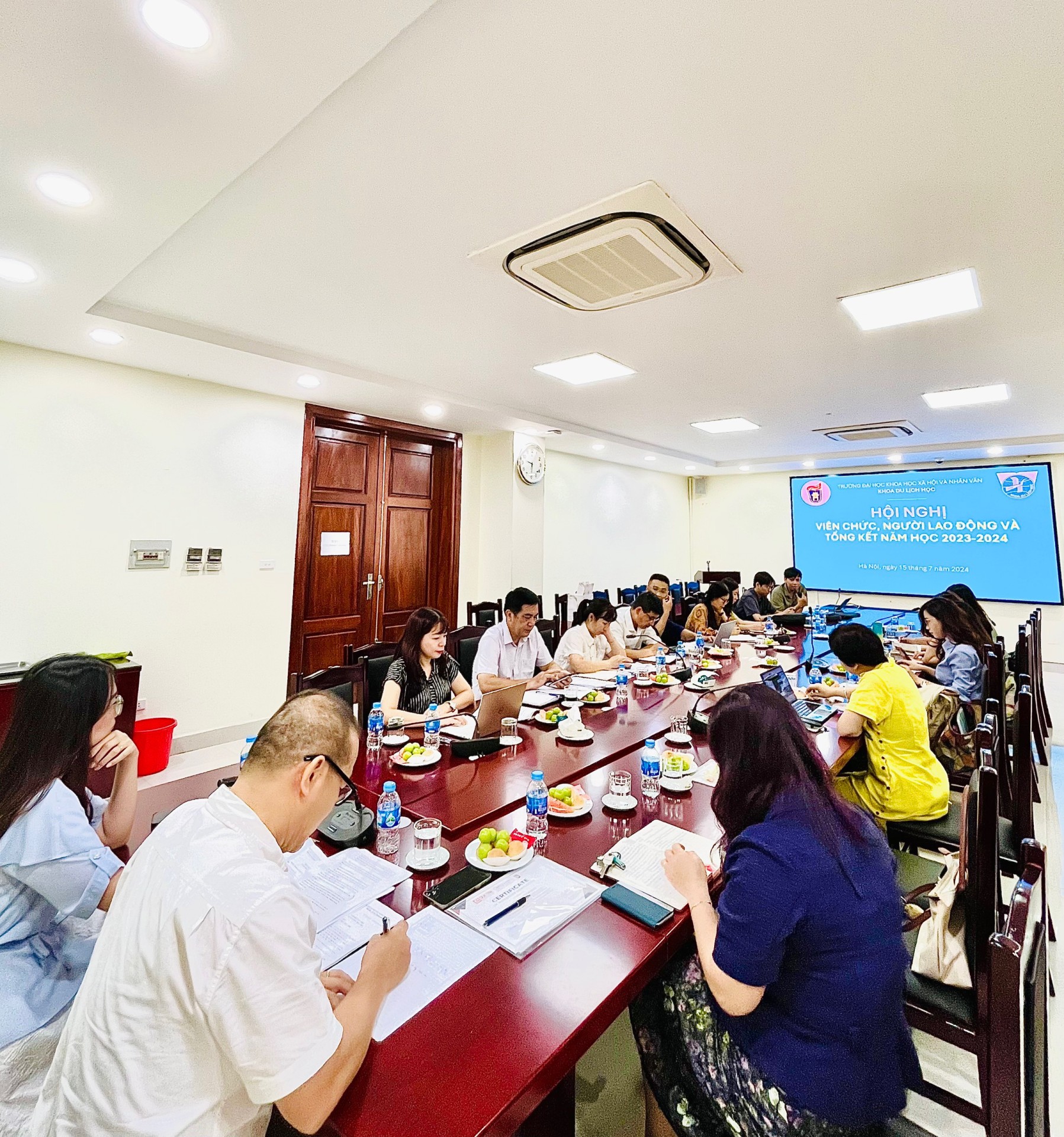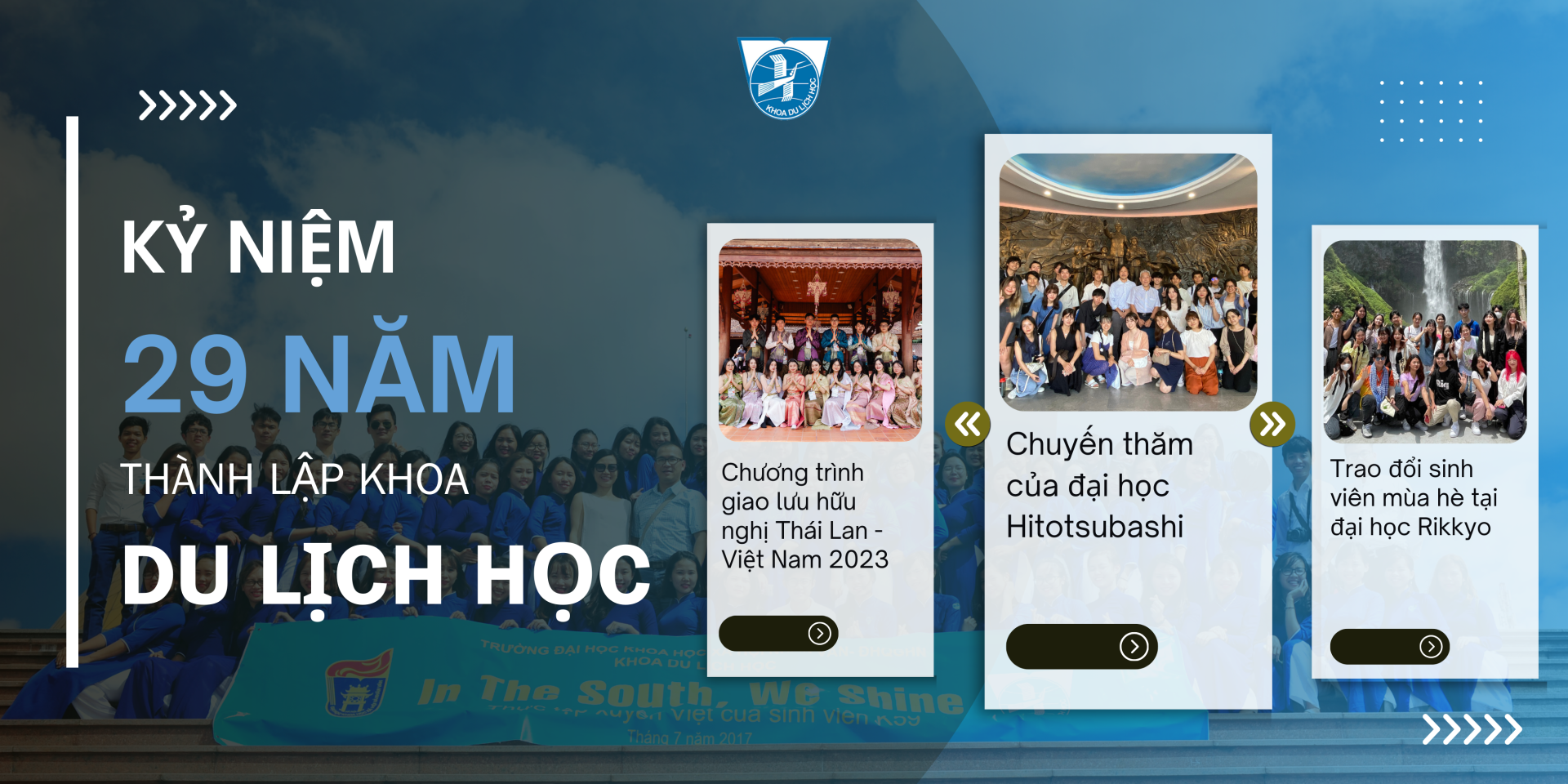Critical Tourism Studies - Asia Pacific

CALL FOR PAPERS & SESSIONS
3rd Critical Tourism Studies - Asia Pacific Conference
Vietnam National University, Hanoi | 13-17 February 2023
Tourism Metamorphosis: Creative Destruction and the Remaking of Tourism Geographies
In February 2020, the 2nd Critical Tourism Studies - Asia Pacific conference was convened at Wakayama University, Japan, with the theme Tourism in Troubled Times - a prescient call for what was about to rapidly unfold. Since then, the tourism industry weathered the hardest cutbacks since modern tourism emerged, as the COVID-19 pandemic raged across the globe. Yet in the midst of this hard hitting pandemic, the catchphrase, ‘build back better’ reverberated across tourism circles, even as we are still re-imagining what we mean by “better”. The third biennial Critical Tourism Studies – Asia Pacific conference addresses this widespread sentiment by focusing on tourism metamorphosis throughout the Asia-Pacific region.

We invite papers that address the emergence from the pandemic-induced chrysalis that pave the way for a future that accounts for the deepest concerns of communities, businesses, and governments. Recovery from almost three years of exceptional challenges in the wake of the COVID-19 pandemic requires a radical remaking of tourism geographies. The invocation of metamorphosis accounts for the process of renewal through the creative destruction of old modes of travel. Bursting with possibility, new, more conscious travel experiences have the potential to prioritize the wellbeing of the planet and its people over the pure pursuit of profits. Yet, while cautiously optimistic, scholars such as Jason W. Moore demonstrate how these kinds of radical shifts require new concepts, stories and philosophies to make sense of the global present. He warns, the kind of thinking that created today’s global turbulence is unlikely to help us solve our current troubles (Moore, 2016, p. 1) - we critically need new ways of thinking, new ways of doing, and new ways of talking about tourism, to address the issues of these troubled times – conversations that CTS-AP has embarked on since 2020.
Despite the amplification of concerns over climate change, inequality, and gender equity, the global community maintains an inertia pitting action as something that must wait. Prevarications stave off radical change to avoid the present day costs of doing so despite the looming anxieties about the breakdown of planetary systems. ‘Rebuilding what once was’ is perhaps an efficient route for tourism businesses that were battered for a prolonged period in a pandemic. Hence, this conference calls for a metamorphosis in tourism signaling an allegoric anecdote for humankind, where the emergent catastrophe is anthropogenic. Tourism metamorphosis speaks of inertia and a befuddlement of how to deal with the challenges of a status quo that remains stubborn, and in the end, leaves a trail of destruction in its wake. Although, through calamity, tourism metamorphosis signals the materialization of optimism, as the lessons learned make way for a radically transformed setting.
Apropos, tourism metamorphosis is in the offing, where troubled times, paves the way for an urgent reckoning toward a remaking of tourism geographies that accounts for the consequences of untrammeled growth, climate change and planetary limitations. Metamorphosis as a heuristic device is central to the framing of the 3rd Critical Tourism Studies Asia Pacific conference that seeks to advance from ‘end times’ narratives, toward what Joseph Schumpeter refers to as creative destruction – the stage at which radical and generative rethinking follows a period of disruption and chaos.
Pursuing unrestrained growth and living within planetary means has never been so urgent. Amidst the debris from and the aftereffects of the coronavirus pandemic, war, and climate change effects, we engage with Ulrich Beck’s invocation of metamorphosis which implies a radical transformation through which the certainties of modern society are being replaced by new ways of thinking and acting. Thus, Beck argues, “To grasp the metamorphosis of the world it is necessary to explore the new beginnings, to focus on what is emerging from the old and seek to grasp future structures and norms in the turmoil of the present” (Beck, 2016, p. 3). Others, such as Bruno Latour reiterate the clamor for a metamorphosis, insisting that a cosmological crisis has erupted in ways that reorient human life and reorder planetary primacies (Latour, 2021, p. 119).”
Dialogues, Approaches and Pathways
Set in the Asia Pacific, the Tourism Metamorphosis theme of the 3rd Critical Tourism Studies Asia Pacific conference engages with the broad notions of metamorphosis – as a heuristic and conceptual touchstone. Empirical and theoretical insights that engage with the metamorphosis of tourism geographies will contribute to new ways of thinking, feeling and doing tourism research and practice.
Dialogues at the 3rd Critical Tourism Studies Asia Pacific conference will be bold, pushing the boundaries of tourism research into novel and challenging frontiers of scholarship. Contributions will transition from narratives of ‘troubled times’ and simplistic entreaties such as ‘building back better’, towards substantive queries into how creative destruction is afoot.
Potential key themes (among others and in no particular order) may include:
Keynotes
To be advised shortly.
Conference Publication Opportunities
To be advised shortly.
Conference Sponsorship
Please email jmcheer@wakayama-u.ac.jp
Deadlines and Important Dates
Sessions
Sessions are called for where organisers will coalesce papers under a coherent and unified theme. These can be (1) closed (organisers secure appropriate papers for their session) or (2) open sessions (organisers make a public call). Sessions will be comprised of up to 5 papers. Organisers should prepare a 400-word session description with instructions clearly outlined and should include:
Session Proposal Deadline: 15 August, 2022.
Feedback and decision on proposed sessions: 30 August, 2022.
Email to: criticaltourismstudies@gmail.com
Abstracts
Abstracts should comprise of up to 400 words and include:
Abstract submission deadline: 30 August, 2022
Decision on abstracts: 30 September
Email to: criticaltourismstudies@gmail.com
Author guidelines
Organising Committee
Co-Chairs
References
Beck, U. (2016). The metamorphosis of the world: How climate change is transforming our concept of the world. Polity.
Kafka, F, (1915). The Metamorphosis. Kurt Wolf Verlag.
Latour, B. (2021). After lockdown: A metamorphosis. Polity.
Moore, J. W. (Ed.). (2016). Anthropocene or capitalocene? Nature, history, and the crisis of capitalism. PM Press.
Schumpeter, J. A. (1942). Capitalism, Socialism and Democracy. Harvard University Press.
Sin, H. L., Mostafanezhad, M., & Cheer, J. M. (Eds.). (2022). Recentering Tourism Geographies in the ‘Asian Century’. Routledge.
Nguồn: https://www.criticaltourismstudies.com/?fbclid=IwAR3oXP_usjJZnn2U7XHF69xrUAg60ERFJLkcTOD2vPt9ILfiDqWc6UJwdBg
3rd Critical Tourism Studies - Asia Pacific Conference
Vietnam National University, Hanoi | 13-17 February 2023
Tourism Metamorphosis: Creative Destruction and the Remaking of Tourism Geographies
In February 2020, the 2nd Critical Tourism Studies - Asia Pacific conference was convened at Wakayama University, Japan, with the theme Tourism in Troubled Times - a prescient call for what was about to rapidly unfold. Since then, the tourism industry weathered the hardest cutbacks since modern tourism emerged, as the COVID-19 pandemic raged across the globe. Yet in the midst of this hard hitting pandemic, the catchphrase, ‘build back better’ reverberated across tourism circles, even as we are still re-imagining what we mean by “better”. The third biennial Critical Tourism Studies – Asia Pacific conference addresses this widespread sentiment by focusing on tourism metamorphosis throughout the Asia-Pacific region.

We invite papers that address the emergence from the pandemic-induced chrysalis that pave the way for a future that accounts for the deepest concerns of communities, businesses, and governments. Recovery from almost three years of exceptional challenges in the wake of the COVID-19 pandemic requires a radical remaking of tourism geographies. The invocation of metamorphosis accounts for the process of renewal through the creative destruction of old modes of travel. Bursting with possibility, new, more conscious travel experiences have the potential to prioritize the wellbeing of the planet and its people over the pure pursuit of profits. Yet, while cautiously optimistic, scholars such as Jason W. Moore demonstrate how these kinds of radical shifts require new concepts, stories and philosophies to make sense of the global present. He warns, the kind of thinking that created today’s global turbulence is unlikely to help us solve our current troubles (Moore, 2016, p. 1) - we critically need new ways of thinking, new ways of doing, and new ways of talking about tourism, to address the issues of these troubled times – conversations that CTS-AP has embarked on since 2020.
Despite the amplification of concerns over climate change, inequality, and gender equity, the global community maintains an inertia pitting action as something that must wait. Prevarications stave off radical change to avoid the present day costs of doing so despite the looming anxieties about the breakdown of planetary systems. ‘Rebuilding what once was’ is perhaps an efficient route for tourism businesses that were battered for a prolonged period in a pandemic. Hence, this conference calls for a metamorphosis in tourism signaling an allegoric anecdote for humankind, where the emergent catastrophe is anthropogenic. Tourism metamorphosis speaks of inertia and a befuddlement of how to deal with the challenges of a status quo that remains stubborn, and in the end, leaves a trail of destruction in its wake. Although, through calamity, tourism metamorphosis signals the materialization of optimism, as the lessons learned make way for a radically transformed setting.
Apropos, tourism metamorphosis is in the offing, where troubled times, paves the way for an urgent reckoning toward a remaking of tourism geographies that accounts for the consequences of untrammeled growth, climate change and planetary limitations. Metamorphosis as a heuristic device is central to the framing of the 3rd Critical Tourism Studies Asia Pacific conference that seeks to advance from ‘end times’ narratives, toward what Joseph Schumpeter refers to as creative destruction – the stage at which radical and generative rethinking follows a period of disruption and chaos.
Pursuing unrestrained growth and living within planetary means has never been so urgent. Amidst the debris from and the aftereffects of the coronavirus pandemic, war, and climate change effects, we engage with Ulrich Beck’s invocation of metamorphosis which implies a radical transformation through which the certainties of modern society are being replaced by new ways of thinking and acting. Thus, Beck argues, “To grasp the metamorphosis of the world it is necessary to explore the new beginnings, to focus on what is emerging from the old and seek to grasp future structures and norms in the turmoil of the present” (Beck, 2016, p. 3). Others, such as Bruno Latour reiterate the clamor for a metamorphosis, insisting that a cosmological crisis has erupted in ways that reorient human life and reorder planetary primacies (Latour, 2021, p. 119).”
Dialogues, Approaches and Pathways
Set in the Asia Pacific, the Tourism Metamorphosis theme of the 3rd Critical Tourism Studies Asia Pacific conference engages with the broad notions of metamorphosis – as a heuristic and conceptual touchstone. Empirical and theoretical insights that engage with the metamorphosis of tourism geographies will contribute to new ways of thinking, feeling and doing tourism research and practice.
Dialogues at the 3rd Critical Tourism Studies Asia Pacific conference will be bold, pushing the boundaries of tourism research into novel and challenging frontiers of scholarship. Contributions will transition from narratives of ‘troubled times’ and simplistic entreaties such as ‘building back better’, towards substantive queries into how creative destruction is afoot.
Potential key themes (among others and in no particular order) may include:
- Degrowth, Inclusive Growth - provocations and implications
- Sustainability - tensions and redundancies
- Postgrowth - contentions and realities
- Topophilia – transformations and stickiness
- Global capitalism – uneven development and disproportionate power
- Biopolitics – power and the powerless
- Anthropocene/Capitalocene – nature and capital
- Geopolitics – cooperation and competition
- Economics – yield and imposition
- Regeneration – substance and hype
- Everyday – mundanity and exception
- Advocacy – grassroots and academic
- Gender, Race, Ethnicity– binaries and pluralities
- Culture – traditional and contemporary
- Heritage – valued and commodified
- Nature – endangered and exploited
- Non-human – veneration and disregard
- Spirituality – devotion and spectacle
- Climate – action and inertia
- Justice, Equity – responsibility and negligence
- Heritage – protection and development
- Planning – deliberate and disordered
- Environment – pristine and desecrated
- Space – shared or restricted
- Theory – contributions and criticisms
- Method – innovations and endeavours
- Livelihoods – constrained and augmented
- Rural – revitalization and decline
- Urban – liveability and congestion
- Governance – efficacy and impracticality
- Neoliberalism – regulation and deregulation
- Social movements – uprising and suppressing
- Pilgrimage – journeys and endings
Keynotes
To be advised shortly.
Conference Publication Opportunities
To be advised shortly.
Conference Sponsorship
Please email jmcheer@wakayama-u.ac.jp
Deadlines and Important Dates
Sessions
Sessions are called for where organisers will coalesce papers under a coherent and unified theme. These can be (1) closed (organisers secure appropriate papers for their session) or (2) open sessions (organisers make a public call). Sessions will be comprised of up to 5 papers. Organisers should prepare a 400-word session description with instructions clearly outlined and should include:
- Session title (descriptive and unambiguous)
- Organiser/s names, affiliations and email addresses
- Concept/theme with clear description of background, aims and key guiding literature
- Session proposal to be labelled – Proposer names_CTSAP3 Session proposal
- Structure required of abstracts (see below)
Session Proposal Deadline: 15 August, 2022.
Feedback and decision on proposed sessions: 30 August, 2022.
Email to: criticaltourismstudies@gmail.com
Abstracts
Abstracts should comprise of up to 400 words and include:
- Abstract title (descriptive and unambiguous)
- Author names, affiliations and email addresses
- Research context and background
- Research question/problem statement
- Methods employed and rationale
- Findings and results
- Discussion and contribution to critical tourism studies
- Keywords (up to 5)
- Abstract to be labelled – author surname_CTSAP3 Abstract
Abstract submission deadline: 30 August, 2022
Decision on abstracts: 30 September
Email to: criticaltourismstudies@gmail.com
Author guidelines
- The 3rd Critical Tourism Studies Asia Pacific abides by APA7
- 12 Font, Times New Roman
- Single space
Organising Committee
Co-Chairs
- Long Hong Pham, Vietnam National University, Vietnam
- Harng Luh Sin, James Cook University Singapore Campus, Singapore
- Mary Mostafenezhad, University of Hawaiʻi at Mānoa, USA
- Joseph M. Cheer, Wakayama University, Japan; AUT, New Zealand; UCSI University, Malaysia
- Husna Zainal Abidin, Wakayama University, Japan
- Jaeyeon Choe, Swansea University, Wales
- Claudia Dolezal, IMC University of Applied Sciences Krems, Austria
- Jeremy Lemarie, University of Reims Champagne-Ardenne, France
- Dung Nguyen, Vietnam National University, Vietnam
- Quỳnh Bùi Nhật, Vietnam National University, Vietnam
- Chin Ee Ong, Sun Yat Sen University, China
- Faith Ong, Unviersity of Queensland, Australia
- Yana Wengel, Hainan University-Arizona State University, China
- Aaron Tham, University of the Sunshine Coast, Australia
- Hazel Tucker, University of Otago, New Zealand
References
Beck, U. (2016). The metamorphosis of the world: How climate change is transforming our concept of the world. Polity.
Kafka, F, (1915). The Metamorphosis. Kurt Wolf Verlag.
Latour, B. (2021). After lockdown: A metamorphosis. Polity.
Moore, J. W. (Ed.). (2016). Anthropocene or capitalocene? Nature, history, and the crisis of capitalism. PM Press.
Schumpeter, J. A. (1942). Capitalism, Socialism and Democracy. Harvard University Press.
Sin, H. L., Mostafanezhad, M., & Cheer, J. M. (Eds.). (2022). Recentering Tourism Geographies in the ‘Asian Century’. Routledge.
Nguồn: https://www.criticaltourismstudies.com/?fbclid=IwAR3oXP_usjJZnn2U7XHF69xrUAg60ERFJLkcTOD2vPt9ILfiDqWc6UJwdBg
Ý kiến bạn đọc
Bạn cần đăng nhập với tư cách là Thành viên chính thức để có thể bình luận
Những tin mới hơn
Những tin cũ hơn
Thống kê truy cập
- Đang truy cập9
- Máy chủ tìm kiếm4
- Khách viếng thăm5
- Hôm nay73
- Tháng hiện tại73
- Tổng lượt truy cập2,461,982



